Today's Friday • 12 mins read
— By Dr. Sandip Roy.
I understand the beginner’s conundrum; I’m still there after a decade-long dabbler in Stoicism.
The beginner wants to test the waters before taking the dive. Most do not want to spend their dime or time before making sure a new pursuit is worth their effort.
So, what follows is an internet search for free+good material on the subject.
But where does one go beyond free-access articles and social media posts? To the books, of course.
So, if you found a recent interest in Stoic philosophy and want to explore more, we list the best books on Stoicism for beginners by ancient and modern authors.
20 Best Stoicism Books For Beginners
- A Guide to the Good Life: The Ancient Art of Stoic Joy by William Irvine: A modern guide that blends Stoic principles with practical advice for finding tranquility and joy. Perfect for beginners looking for an engaging, contemporary introduction.
- Stoicism (Ancient Philosophies), 2nd Edition by John Sellars: A scholarly yet accessible overview of Stoic philosophy, tracing its history, key figures, and core ideas. Great for beginners wanting a clear academic foundation.
- How to Be a Stoic: Using Ancient Philosophy to Live a Modern Life by Massimo Pigliucci: A reader-friendly guide that applies Stoic principles to modern challenges, blending philosophy with personal anecdotes. Pigliucci, a career philosopher, shows us how Stoicism may give a philosophy of life that is compatible with today’s scientific worldview and can coexist with atheism, agnosticism, and other forms of religion. He gives many vivid instances of everyday situations in which he found Stoic philosophy useful in his own life. A relatable entry point into Stoic philosophy.
- Stoicism and the Art of Happiness by Donald Robertson: A simple-to-understand guide to Stoic ideas and techniques. Many practical ways to use in daily life to increase well-being. Ideal for beginners seeking a blend of theory and practice.
- How to Think Like a Roman Emperor: The Stoic Philosophy of Marcus Aurelius by Donald Robertson: A well-known figure in modern Stoicism, cognitive psychotherapist Donald Robertson, smoothly blends the life and philosophy of the Roman Emperor Marcus Aurelius to give the reader a fascinating modern-day guide to the Stoic wisdom. He combines Marcus Aurelius’s life story with Stoic practices, giving us actionable lessons for resilience and mindfulness. Excellent for beginners interested in history and philosophy.
- The Practicing Stoic: A Philosophical User’s Manual by Ward Farnsworth: A structured guide that distills Stoic teachings into practical lessons with clear examples. Perfect for beginners wanting a straightforward, hands-on approach.
- The Daily Stoic: 366 Meditations on Wisdom, Perseverance, and the Art of Living by Ryan Holiday and Stephen Hanselman: Offers daily Stoic reflections and exercises, drawing from ancient texts to inspire modern practice. Presented in a page-per-day format, this daily resource of Stoic inspiration combines new translations of Seneca, Epictetus, and Zeno, with calls to further reflection and action by the authors. Arranged topically following the same three movements (Perception, Action, Will), this guide features twelve principles for overcoming obstacles and achieving greater satisfaction. Great for beginners seeking bite-sized, actionable wisdom.
- A Handbook for New Stoics: How to Thrive in a World Out of Your Control by Massimo Pigliucci, Gregory Lopez: A 52-week program with practical exercises to apply Stoic principles in daily life. Ideal for beginners looking for a structured, hands-on guide.
- The Beginner’s Guide to Stoicism: Tools for Emotional Resilience and Positivity by Matthew Van Natta: A concise introduction to Stoic concepts with practical tools for emotional strength. Perfect for those new to Stoicism seeking simplicity.
- Stoicism: A Very Short Introduction by Brad Inwood: A compact, scholarly overview of Stoic philosophy, covering its history and key ideas. Great for beginners wanting a quick, authoritative introduction.
- Mastering The Stoic Way Of Life by Andreas Athanas: A beginner-friendly guide focusing on Stoic practices for self-mastery and living with purpose. Great for those wanting a modern, practical approach.
- A Field Guide to a Happy Life: 53 Brief Lessons for Living by Massimo Pigliucci: A modern reimagining of Epictetus’s Enchiridion, offering short, practical Stoic lessons. Ideal for beginners seeking concise, modern applications.
- On The Good Life by Cicero: A collection of Cicero’s essays blending Stoicism with Roman philosophy, exploring virtue and happiness. Suitable for beginners interested in broader philosophical perspectives.
- Unshakable Freedom: Ancient Stoic Secrets by Chuck Chakrapani: Simplifies Stoic principles for achieving inner freedom and resilience in modern life. Perfect for beginners looking for clear, practical guidance.
- Letters From A Stoic by Lucius Annaeus Seneca and Robin Campbell: Seneca’s letters offer practical Stoic advice on ethics, adversity, and living well. A timeless, beginner-friendly primary source.
- Lectures And Fragments by Musonius Rufus: A collection of teachings from Epictetus’s teacher, focusing on practical Stoic ethics and simplicity. Best for beginners interested in lesser-known Stoic voices.
- How to Be Free: An Ancient Guide to the Stoic Life (Ancient Wisdom for Modern Readers) by Epictetus and Anthony A. Long: A fresh translation of Epictetus’s teachings on freedom and virtue, with commentary for modern readers. Great for beginners wanting accessible primary texts.
- The Enchiridion and The Discourses by Epictetus: The Enchiridion is a concise manual of Stoic ethics, while The Discourses provide deeper discussions on freedom and virtue. Essential for understanding Epictetus’s practical approach to Stoicism.
- Meditations by Marcus Aurelius (A New Translation by Gregory Hays): A personal journal of the Roman Emperor’s reflections, offering profound Stoic insights on duty, mortality, and self-discipline in a clear, accessible translation. Ideal for beginners seeking a primary source of Stoic wisdom.
- Meditations: The Annotated Edition by Marcus Aurelius (Annotated and Edited by Robin Waterfield): An annotated version of Marcus Aurelius’s reflections, with notes clarifying Stoic concepts. Perfect for beginners seeking deeper context for this classic text.
5 Best Free Books On Stoicism by Ancient Authors

In this, we pick up the books that are free to access and read. It also includes a few starter books you can buy. The books on this list are some of the most readable, graspable, and applicable works from Stoic literature.
1. Meditations by Marcus Aurelius
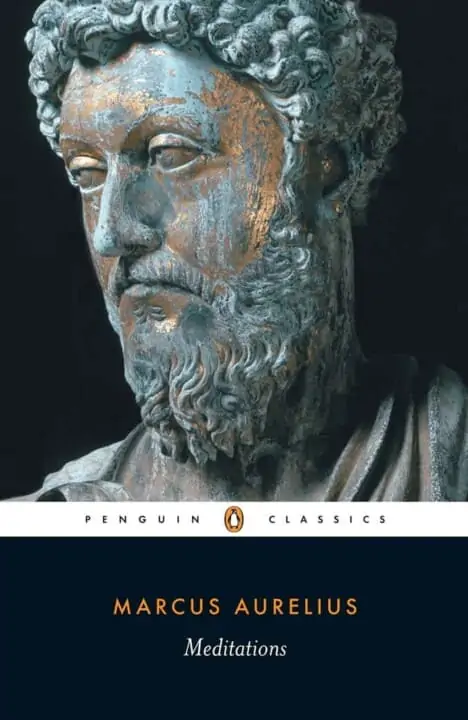
Written by an ancient Stoic, Meditations is easily a great book for both beginners and advanced readers. It reads as philosophical poetry, written by Marcus Aurelius, a practicing Stoic for nearly 40 years.
Remarkably, Marcus wrote it for himself as a personal journal, wanting to follow what he learned from his mentors. Marcus wrote in Greek, the language of his philosophical thoughts.
When he died in 180 CE, the manuscript vanished. Then somehow it found its way to be published in 1559 under the title To Himself. Today, several brilliant translations of Meditations are available.
The best translations of the Meditations of Marcus Aurelius are:
- Meditations: A New Translation by Gregory Hays
- Meditations translated by Martin Hammond
- Meditations: The Philosophy Classic (Capstone Classics) by George Long, with an introduction by Donald Robertson
The free ones on the internet are below:
- The Meditations of Marcus Aurelius rendered by George W. Chrystal
- Meditations by Marcus Aurelius produced by Boulton and Widger
A Marcus Aurelius Quote:
Do not imagine that, if something is hard for you to achieve, it is therefore impossible for any man: but rather consider anything that is humanly possible and appropriate to lie within your own reach too.
— Marcus Aurelius, Meditations 6.19
2. The Enchiridion by Epictetus
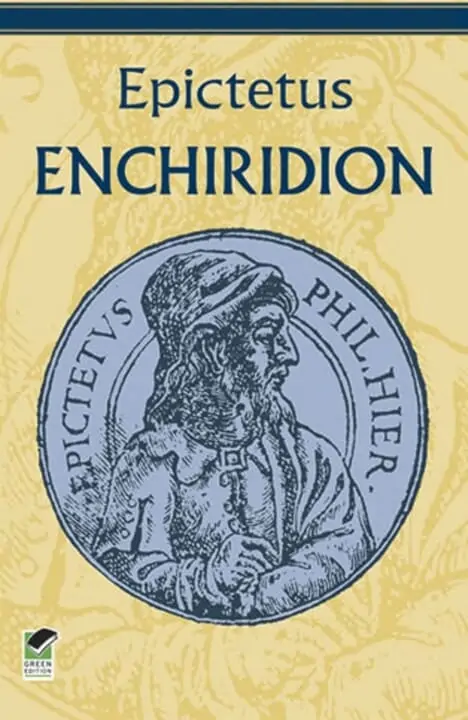
The Enchiridion, or The Handbook, is a concise manual of ethical advice by the 2nd-century Stoic philosopher Epictetus. It was compiled by his disciple Arrian from his lectures. It doesn’t go into metaphysics, but rather focuses on how to use Stoic ideas in everyday life.
Epictetus (50 CE to 130 CE) was born in a slave family. He had a permanent leg disability, likely due to his owner, Epaphroditus, twisting his leg to punish him.
Later, Epaphroditus allowed him to attend lectures of Musonius Rufus, a Roman senator and Stoic teacher. After gaining his freedom, Epictetus began teaching Stoicism.
The Enchiridion offers practical wisdom advice for those seeking contentment or eudaimonia. Epictetus said we can always be happy if we learn to expect and accept things just as they turn out. He also insisted that we can learn to live in harmony with Nature.
The best ones of Epictetus’ works to buy are:
- Epictetus: Discourses, Fragments, Handbook by Robin Hard and Christopher Gill
- Discourses and Selected Writings by Epictetus, translated by Robert Dobbin
- Enchiridion translated by George Long
The free ones on the internet are here below:
- The Good Life Handbook: Epictetus’ Stoic Classic Enchiridion by Chuck Chakrapani (Kindle version)
- Epictetus, Enchiridion by Thomas Wentworth Higginson
An Epictetus’ Quote:
Ask not that events should happen as you will, but let your will be that events should happen as they do, and you shall have peace.
— Epictetus, Enchiridion, 8
3. Letters From A Stoic by Seneca
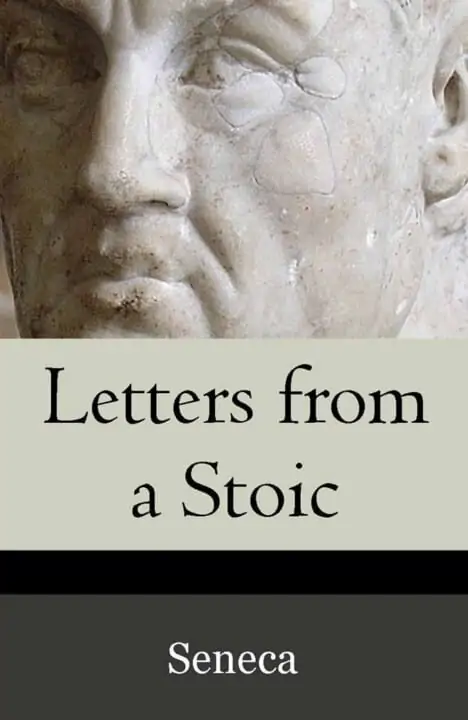
Born in 4 BCE, Seneca lived through the reigns of the first five emperors of Rome.
Strangely, at least three of these emperors had wanted him dead. First, it was Caligula in 37 CE. Then, it was Claudius in 41 CE. Finally, it was Nero in 65 CE, who forced Seneca to take his own life.
Letters or Epistles are a compilation of 124 essays as letters to Lucilius. Lucilius was a friend of Seneca and a procurator of Sicily. Seneca’s Letters try to win him over to Stoicism.
Seneca wrote these in his final two years of his life while he was exiled on the island of Corsica. These letters were initially translated from Latin to English by Thomas Lodge in 1614.
The best ones of Seneca’s works to buy are:
- Letters from a Stoic by Lucius Annaeus Seneca, translated by Robin Campbell
- Moral Letters to Lucilius by Lucius Annaeus Seneca, translated by Richard Mott Gummere and J. C. Rolfe
- On the Shortness of Life by Seneca, translated by C. D. N. Costa
The free ones on the internet are below:
- The Tao of Seneca: Letters From A Stoic Master (3 volumes)
- Moral letters to Lucilius (Epistulae morales ad Lucilium) by Seneca, translated by Richard Mott Gummere
A Seneca Quote:
If you really want to escape the things that harass you, what you’re needing is not to be in a different place but to be a different person.
― Lucius Annaeus Seneca, Letters from a Stoic
4. Letters of Marcus Tullius Cicero by Cicero
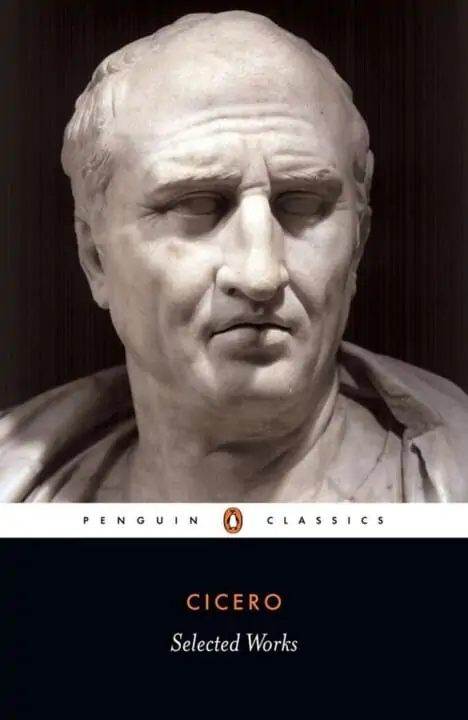
Marcus Tullius Cicero was Rome’s greatest orator of his time. He was a career senator and lawyer. He was also a philosopher, a prolific writer, and an unmatched Greek-to-Latin translator.
Unfortunately, his life coincided with the decline of the Roman Republic. Cicero witnessed Julius Caesar’s murder by Brutus on the Ides of March in 44 BCE. A year later, Mark Antony ordered his execution.
We get an idea of Cicero’s relevance today as we see he gave us some of the most common words in modern English: quality, notion, individual, infinity, moral, and comprehension.
Cicero’s philosophy aligned with the virtue-driven Stoics.
The best ones of Cicero’s works to buy are:
- Selected Works by Cicero, translated by Michael Grant
- On the Good Life by Cicero, translated by Grant Michael
- Selected Political Speeches by Marcus Tullius Cicero, translated by Michael Grant
The free ones on the internet are below:
- Letters of Marcus Tullius Cicero by Cicero, translated by Evelyn Shirley Shuckburgh (Kindle version)
- Eight orations of Cicero, together with selected passages and letters; translated by C. F. W. Miiller
A Cicero Quote:
The life of the dead is placed on the memories of the living. The love you gave in life keeps people alive beyond their time. Anyone who was given love will always live on in another’s heart.
― Marcus Tullius Cicero
5. Lectures And Fragments by Musonius Rufus
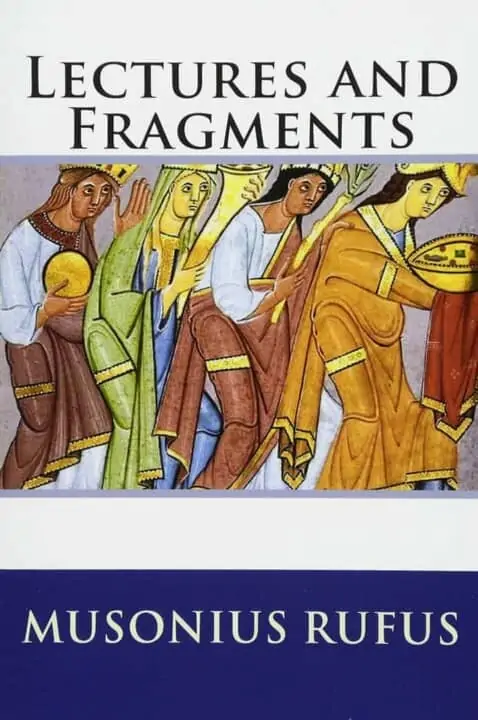
Gaius Musonius Rufus was a great Stoic master in ancient Rome. He was highly respected and was called The Roman Socrates.
Musonius insisted that practice is more important than theory. He could sway a listener into action with just a few precise arguments.
He dismissed a life of pleasure. He condemned all luxuries and lived on a strict vegetarian diet and cheaply priced clothing.
To him, virtue was the only good. He believed the soul becomes resilient by enduring hardships and resisting temptations.
Musonius had many illustrious pupils. His greatest student was Epictetus, who mentions him several times in The Discourses.
The best ones of Musonius Rufus’ works to buy are:
- Musonius Rufus: Lectures and Sayings by Cynthia King
- Stoic Lessons: Musonius Rufus’ Complete Works by Chuck Chakrapani
- That One Should Disdain Hardships: The Teachings of a Roman Stoic by Musonius Rufus, translated by Cora E. Lutz
The free ones on the internet are below:
A Musonius Rufus Quote:
You will earn the respect of all if you begin by earning the respect of yourself. Don’t expect to encourage good deeds in people conscious of your own misdeeds.
― Musonius Rufus, How To Live
Final Words
Stoicism has been followed by people over the centuries as a path to achieving greater fulfillment and emotional resilience. But why Stoicism is even more relevant today?
You may not find another set of philosophical writing more freely and easily accessible than Stoicism. So, get started on giving your life a Stoic touch.
P.S.: We do not store any of the books mentioned in the links above. You may visit the links to find and buy/read the books there.
• • •
√ Also Read: Get A Stoic Mindset. Model Your Best Possible Life.
√ Please share it with someone if you found this helpful.